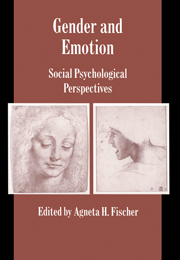Book contents
- Frontmatter
- Contents
- Preface
- Contributors
- Part I Culture, gender, and emotional beliefs
- Part II Emotion expression and communication
- Part III Distinct emotions
- 9 Women, men, and positive emotions: A social role interpretation
- 10 Gender and anger
- 11 Gender, sadness, and depression: The development of emotional focus through gendered discourse
- 12 Engendering gender differences in shame and guilt: Stereotypes, socialization, and situational pressures
- 13 Sex differences in anxiety and depression: Empirical evidence and methodological questions
- Part IV Epilogue
- Indexes
- Studies in Emotion and Social Interaction
10 - Gender and anger
Published online by Cambridge University Press: 20 January 2010
- Frontmatter
- Contents
- Preface
- Contributors
- Part I Culture, gender, and emotional beliefs
- Part II Emotion expression and communication
- Part III Distinct emotions
- 9 Women, men, and positive emotions: A social role interpretation
- 10 Gender and anger
- 11 Gender, sadness, and depression: The development of emotional focus through gendered discourse
- 12 Engendering gender differences in shame and guilt: Stereotypes, socialization, and situational pressures
- 13 Sex differences in anxiety and depression: Empirical evidence and methodological questions
- Part IV Epilogue
- Indexes
- Studies in Emotion and Social Interaction
Summary
Anger is momentary madness
HoraceLike women's anger, impotent and loud
DrydenWhat happens when we approach a lane closure while driving on the freeway, and a car cuts rapidly in front of us just before the lane closes, forcing us to brake abruptly? What happens when a romantic partner accuses us of flirting when we have done no such thing? What happens when we hear a news report telling us that 4 million children in the United States go hungry every day? Perhaps the most common response to these scenarios is anger. Anger is a commonly experienced and expressed emotion, and contrary to persistent myths and stereotypes, women and men both get angry in response to these types of situations. Indeed, conventional wisdom suggests that anger is a “male” emotion: women don't get angry, and if they do, they certainly don't show it. Yet, as this chapter will show, the bulk of the empirical evidence does not support these contentions. The literature on anger clearly demonstrates the need to modify questions about gender differences in emotion from the more global (e.g., do men and women differ?) to the more specific (e.g., under what conditions and in the presence of whom might men and women differ?). Differences in the experience and expression of anger have as much to do with other variables such as social context, status, and gender role as they do with gender.
Although a number of excellent reviews of gender differences in emotion more generally have recently been published (e.g., Brody & Hall, 1993; Fischer, 1993; Shields, 1991), few reviews have specifically considered gender differences in anger.
- Type
- Chapter
- Information
- Gender and EmotionSocial Psychological Perspectives, pp. 211 - 231Publisher: Cambridge University PressPrint publication year: 2000
- 88
- Cited by



